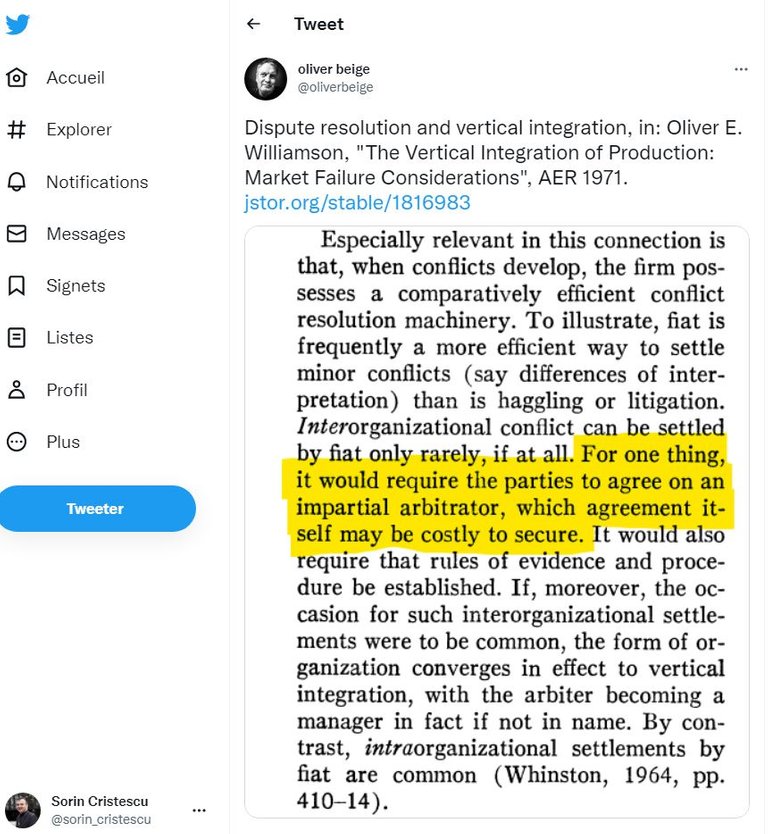Oliver Williamson is one of the greatest economic thinkers of the past century. However, I've only learned about him thanks to another Oliver, namely Oliver Beige, one of the brilliant minds who, for unfathomable reasons, graces us with the fruit of his spirit on this most frustrating social media platform, Twitter. And on Medium, but alas, again for unfathomable reasons, not on Hive.

Oliver Beige recently tweeted on the topic of "firm versus market" (see image above). R. Coase and O. Williamson are the most important thinkers at this particular organisational frontier.
In Oliver Beige's tweet, one particular aspect which helps define this frontier is brought in the spotlight: conflict / dispute resolution. If markets are more efficient than firms at allocating capital, they are also relatively helpless when disputes arise, and need an external arbitrator, which usually carries a high cost. It can be said that one of the main benefits of the judicial framework and the "rule of law" is offering a relatively controllable and relatively low cost avenue for dispute resolution (when compared with a lawless equivalent environment). In so doing, the legal framework allows the market to expand to more domains and thus increase economic efficiency.
In a firm on the other hand, not unlike in an absolute monarchy or an authoritarian regime, dispute resolution is entrusted to arbiters which often are not upheld to impartiality and regularly cumulate the power to make forward-looking decisions (alongside the power to resolve disputes) - what Williamson presumably means by "manager" in the excerpt illustrated above.
This is where blockchain technology can improve our organizational abilities, fostering the apparition of systems supporting a separation of these powers.
One model, but perhaps not the only one, is the separation of powers in modern states, with the executive being "the manager" and making forward looking decisions while the judiciary is the designated "impartial arbitrator" Williamson refers to.
At the moment, such an "internal wall" is too costly to set up inside all but the largest organisations. Open-source blockchain systems such as Hive might offer the necessary "bricks" to build IT systems able to bring down to an acceptable level the cost of creating and maintaining the fine distinction between "managers" and "arbiters".
Congratulations @sorin.cristescu! You have completed the following achievement on the Hive blockchain And have been rewarded with New badge(s)
Your next target is to reach 66000 upvotes.
You can view your badges on your board and compare yourself to others in the Ranking
If you no longer want to receive notifications, reply to this comment with the word
STOPTo support your work, I also upvoted your post!
Check out our last posts:
Support the HiveBuzz project. Vote for our proposal!
Yay! 🤗
Your content has been boosted with Ecency Points, by @sorin.cristescu.
Use Ecency daily to boost your growth on platform!
Support Ecency
Vote for new Proposal
Delegate HP and earn more
Dear @sorin.cristescu,
Your support for the current HiveBuzz proposal (#199) is much appreciated but it will expire end of December!
May we ask you to review the new proposal (#248) and renew your support so that our team can continue their work next years?
You can support the new proposal on Peakd, Ecency,
https://peakd.com/proposals/248
We wish you a Happy New Year!
wonderful